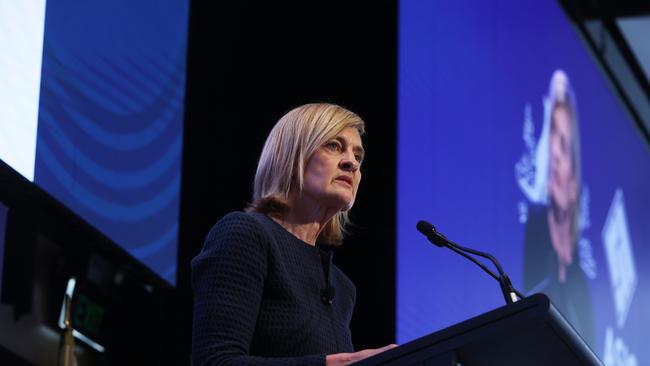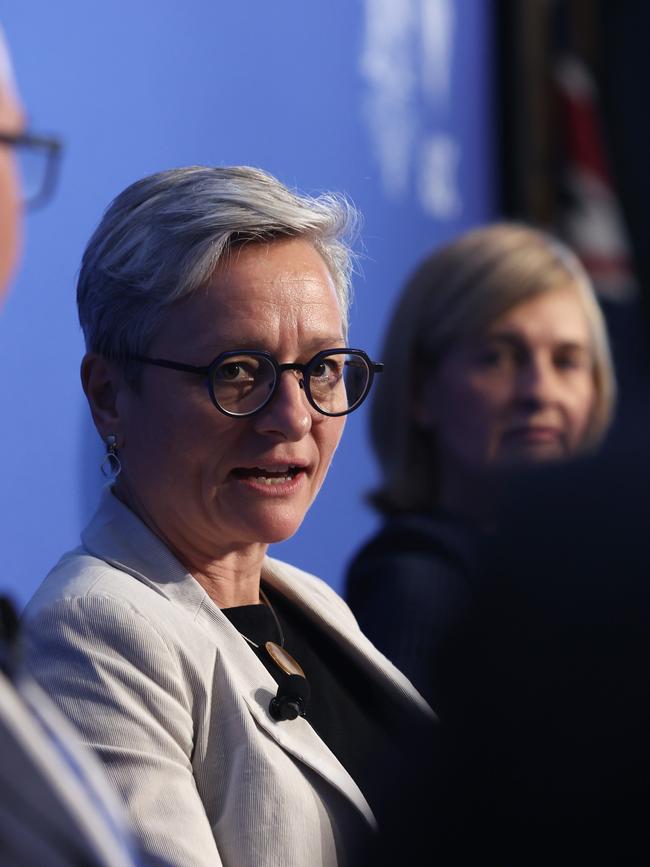Corporate cop to target super misconduct, dodgy investment schemes
Big superannuation funds are on notice from the corporate regulator, which says it is the responsibility of super trustees to reserve money to pay for penalties.

Big superannuation funds are on notice from the corporate regulator, which says it is the responsibility of super trustees to reserve money to pay for penalties, amid fears thousands of Cbus members could be forced to contribute their life savings to fix an alleged money mishandling scandal.
The Australian Securities & Investments Commission launched a blockbuster case against the $92bn fund this week, alleging it took more than a year in some cases for the fund – which is chaired by Labor National President Wayne Swan – to pay out death and disabilities payments.
ASIC deputy chair Sarah Court told the regulator’s annual forum on Thursday the superannuation sector was on notice.
“It is up to superannuation trustees as to how they provide reserves and the extent of those reserves for compliance costs,” she said. “And obviously they are a highly regulated sector by both ASIC and APRA (the Australian Prudential Regulation Authority).
“We take these actions because we are trying to send a strong deterrent message to the sector more broadly, that it is simply unacceptable for these large trustees to fail to deliver to their members.”

She also said it was ASIC’s view that directors who sit around super trustee boards were in no different position than the directors of any other companies.
In the wake of the blockbuster legal action, Ms Court said the watchdog was “sending a signal” to the superannuation sector.
“Your members have rights and entitlements. You’re holding their money, and there is an obligation on you to provide those services promptly, fairly and efficiently,” she said.
“And we are going to continue work in this area, as I foreshadowed, we have got much work to come early in the new year.”
Ms Court made the comments after she delivered the regulator’s 2025 enforcement priorities and a searing pledge to crack down on companies and people seeking to exploit cost of living pressures.
“All research points to cost of living pressures as a paramount issue of the time for Australians,” she said. “We are unapologetically putting the interests of consumers and investors at the heart of everything that we do.”
Joined by Australian Federal Police Commissioner Reece Kershaw and Commonwealth Director of Public Prosecutions director Raelene Sharp, Ms Court said the three enforcement agencies would continue working together to protect Australians from financial harm and target the people who try to take advantage of them.
Mr Kershaw said in the past two years the AFP had charged 97 individuals with money laundering and restrained $1.2bn worth of assets. He said white collar crime was on the increase.
“And it’s more sophisticated than ever before … with the advent of crypto and other ways of hiding your illicit gains and setting up these structures offshore in particular,” he said.
The AFP commissioner also revealed police had for the first time broken into a crypto wallet and seized $9m.
Asked about the length of time it takes to prosecute cases, Ms Sharp said the priority of the court system was to ensure that the process was fair and that the accused rights were respected.
“Respect for the rule of law is expensive. It takes a lot of time, and as frustrating as that is, I’m still proud to live in the community here where that is the priority of the criminal justice system,” she said.

Ms Court agreed that ASIC caps of $4000 per day to pay a barristers’ fees, when they can be $25,000, is a problem.
“Those caps have not been reviewed for more than a decade, and when we head into court, whether it be a criminal matter or a civil matter, we certainly have the top end of town and their very extensive legal resources up against us,” she said. “We want it to be a level playing field.”
On the regulator’s enforcement priorities, Ms Court singled out insurance and super as emerging areas of concern.
“Both are taking on an increasing importance to Australians. Insurance because of issues surrounding climate change, extreme weather events and affordability,” she said. “And superannuation because it makes up such a large part of each person’s wealth and standard of living on retirement.”
Revealing three new enforcement priorities, Ms Court said ASIC had established a “hit squad” to target insider trading.
“ASIC has award-winning real time surveillance technology that assists to ensure that Australia has one of the cleanest markets in the world, (and) to maximise the benefit of this surveillance we have established a specialist team, what I might call a hit squad, to more intensively follow up and investigate our surveillance results,” she said.
“This team already has its work well underway, and strengthening our investigation and prosecution of insider trading will be a key area of work for us in 2025.”
As well, the audit sector should prepare for enhanced surveillance, Ms Court said.
“Auditors play a critical role across the financial system. They are the principal external check on a company’s reporting and the integrity of our markets depends on performance of the auditor role, (and its) independence and integrity,” she said.
“There has been considerable recent public attention on the role of auditors and audit firms, and indeed just last week a parliamentary joint committee delivered a report on the subject.
“Given this interest and the important and unique role played by auditors, we propose to intensify our oversight and enforcement work in this sector.”
Finally, high-risk property schemes that rely on cold calling to lure consumers into transferring their life savings into self-managed super funds will be heavily monitored.
“I have already set out some of the harms we are seeing in relation to the promotion and mis-selling of high-risk property schemes. This misconduct is unfortunately revealing itself to be on an industrial scale,” she said.
“The conduct usually involves a chain of participants with each person or player in the chain collecting a fee from the unsuspecting investor along the way, this can include lead generators, cold callers, financial advisers and conflicted directors of highly speculative property schemes.”
Reflecting on 2024, Ms Court said new investigations jumped by 25 per cent and civil enforcement cases have similarly increased. “ASIC is an active criminal law enforcement agency,” she said. “Our teams are executing warrants, freezing assets and restricting people from fleeing the country so they can be held to account.”





